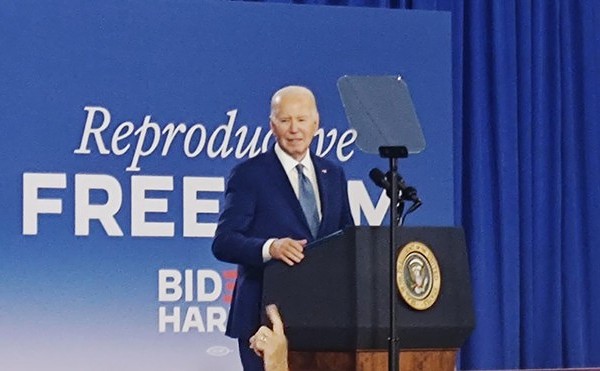Gov. DeSantis signs bill weakening Florida's child labor laws
The measure will ease decades-old regulations on the hours that 16- and 17-year-old can work
By Jim Turner, the News Service of Florida on Mon, Mar 25, 2024 at 10:39 am
Gov. Ron DeSantis on Friday signed a measure that will ease decades-old regulations on the hours that 16- and 17-year-old Floridians can work.
The bill (HB 49), one of 25 signed Friday by DeSantis, was toned down in the waning days of this year’s legislative session but still drew concerns about the impact of longer work hours on students’ studies and the potential use of teens to address labor shortages.
But proponents countered that the bill, backed by groups such as the Florida Restaurant & Lodging Association and the National Federation of Independent Business-Florida, would provide flexibility in standards imposed in 1986 because of child-labor violations in the state.
NFIB-Florida President Bill Herrle said the bill will give parents control over the hours worked by teens.
"No one wants young people to work longer hours or work under unsafe conditions,” Herrle said in a statement Friday. “House Bill 49 simply gives parents and guardians the right to decide what's right for their teens and helps Florida's small businesses find workers.”
On March 8, the final day of the legislative session, the House voted 76-33 to pass the bill, while the Senate passed it 27-11.
Democrats, who are in the minority in both legislative chambers, unsuccessfully sought to make changes to the bill to provide more state oversight for teen workers.
Rep. Anna Eskamani, D-Orlando, called it ironic that lawmakers earlier on March 8 passed a measure (HB 7063) that would prevent strippers under age 21 from working in adult-entertainment establishments. That bill was designed to curb human trafficking.
“I really think that the most vulnerable age for trafficking actually is going to be less than 18, and unfortunately service jobs have very high rates of sexual harassment,” Eskamani said March 8. “And we’re not providing protection for young people.”
The bill drew heavy debate early in the legislative session, as the House proposed eliminating a restriction on 16- and 17-year-old youths working more than eight hours when school is scheduled the next day. The proposal also would have eliminated a restriction on 16- and 17-year-olds working more than 30 hours in a week when school is in session.
But the Senate proposed less far-reaching changes, ultimately resulting in the version signed Friday by DeSantis.
The law, which will go into effect July 1, will maintain a 30-hour work week limit for 16- and 17-year-olds when school is in session. But parents, guardians or school superintendents could waive the 30-hour limit.
Also, the measure will allow 16- and 17-year-olds to work more than eight hours on Sundays and holidays when school is the next day. It will require that 16- and 17-year-olds working eight or more hours in a day get 30-minute meal breaks after four hours of work.
Other bills signed Friday included a measure (HB 533) that will require state prison inmates to submit DNA samples if they have not previously done so and a measure (SB 1746) that was a follow-up to a controversial 2023 law that placed additional restrictions on public-employee unions.
Subscribe to Orlando Weekly newsletters.
Follow us: Apple News | Google News | NewsBreak | Reddit | Instagram | Facebook | Twitter | Or sign up for our RSS Feed
The bill (HB 49), one of 25 signed Friday by DeSantis, was toned down in the waning days of this year’s legislative session but still drew concerns about the impact of longer work hours on students’ studies and the potential use of teens to address labor shortages.
But proponents countered that the bill, backed by groups such as the Florida Restaurant & Lodging Association and the National Federation of Independent Business-Florida, would provide flexibility in standards imposed in 1986 because of child-labor violations in the state.
NFIB-Florida President Bill Herrle said the bill will give parents control over the hours worked by teens.
"No one wants young people to work longer hours or work under unsafe conditions,” Herrle said in a statement Friday. “House Bill 49 simply gives parents and guardians the right to decide what's right for their teens and helps Florida's small businesses find workers.”
On March 8, the final day of the legislative session, the House voted 76-33 to pass the bill, while the Senate passed it 27-11.
Democrats, who are in the minority in both legislative chambers, unsuccessfully sought to make changes to the bill to provide more state oversight for teen workers.
Rep. Anna Eskamani, D-Orlando, called it ironic that lawmakers earlier on March 8 passed a measure (HB 7063) that would prevent strippers under age 21 from working in adult-entertainment establishments. That bill was designed to curb human trafficking.
“I really think that the most vulnerable age for trafficking actually is going to be less than 18, and unfortunately service jobs have very high rates of sexual harassment,” Eskamani said March 8. “And we’re not providing protection for young people.”
The bill drew heavy debate early in the legislative session, as the House proposed eliminating a restriction on 16- and 17-year-old youths working more than eight hours when school is scheduled the next day. The proposal also would have eliminated a restriction on 16- and 17-year-olds working more than 30 hours in a week when school is in session.
But the Senate proposed less far-reaching changes, ultimately resulting in the version signed Friday by DeSantis.
The law, which will go into effect July 1, will maintain a 30-hour work week limit for 16- and 17-year-olds when school is in session. But parents, guardians or school superintendents could waive the 30-hour limit.
Also, the measure will allow 16- and 17-year-olds to work more than eight hours on Sundays and holidays when school is the next day. It will require that 16- and 17-year-olds working eight or more hours in a day get 30-minute meal breaks after four hours of work.
Other bills signed Friday included a measure (HB 533) that will require state prison inmates to submit DNA samples if they have not previously done so and a measure (SB 1746) that was a follow-up to a controversial 2023 law that placed additional restrictions on public-employee unions.
Subscribe to Orlando Weekly newsletters.
Follow us: Apple News | Google News | NewsBreak | Reddit | Instagram | Facebook | Twitter | Or sign up for our RSS Feed

WE LOVE OUR READERS!
Since 1990, Orlando Weekly has served as the free, independent voice of Orlando, and we want to keep it that way.
Becoming an Orlando Weekly Supporter for as little as $5 a month allows us to continue offering readers access to our coverage of local news, food, nightlife, events, and culture with no paywalls.
Scroll to read more Florida News articles
Newsletters
Join Orlando Weekly Newsletters
Subscribe now to get the latest news delivered right to your inbox.

















